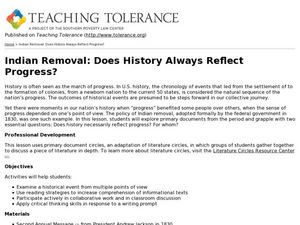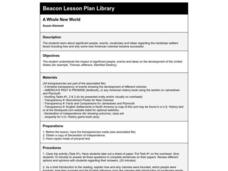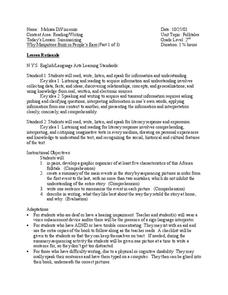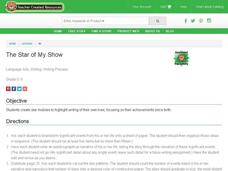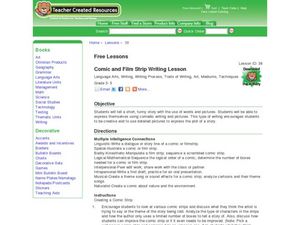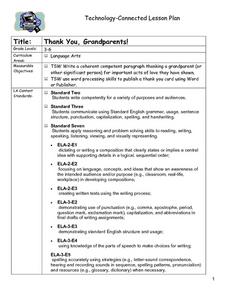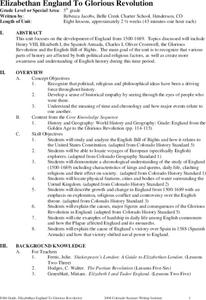Curated OER
Indian Removal: Does History Always Reflect progress?
Young scholars explore the idea that progress for some might not mean progress for all. In this Native American lesson, students recognize different viewpoints about historical events through the study of primary documents. Young...
Curated OER
The Farmer Cares for the Land
Students explore farming by creating visual demonstrations. In this agriculture lesson, students read assigned text about a farmer's duty and identify the events that have taken place in the history of agriculture. Students collaborate...
Curated OER
A Whole New World
Learners examine a timeline of a sequence of events displaying how the colonies were founded. They analyze Jamestown and Plymouth recruitment posters, write journal entries, and play a Jeopardy game with questions about the colonies.
Curated OER
The Three Little Pigs
First graders complete a fairy tales characteristics chart after listening to varoius fairy tales. Individually, they listen to three different versions of "The Three Little Pigs" and complete a separate chart comparing them as well....
Curated OER
“THE LORAX” by Dr. Seuss
Few children's books convey the message of conservation as well as Dr. Seuss' The Lorax. Read the story aloud, emphasizing the interconnectedness of plants and animals in an ecosystem and discussing different ways people can help the...
Curated OER
Hidalgo's Fight for the Independence of Mexico
Tenth graders study and examine the life of Miguel Hidalgo while working to identify major themes. Small groups create sequence of event chains, analyze and label maps of Hidalgo's travels, and work together to create giant chalk maps...
Curated OER
Family Stories and Personal Narratives
Fourth graders read various stories in their literature books about families. Individually, they make a timeline showing the most important events in their lives. They bring in one artifact from their lives and write a paper about it...
Curated OER
Establishing a Point of View in Narratives
Fourth graders investigate the concept and take the opportunity to both identify and to construct point of view in narratives. Additionally, 4th graders practice identifying and sequencing main events.
Curated OER
Middleton/Kuna History Teleconference
Third graders study the history and building of Middleton and Kuna. They create timelines of significant events in the towns' histories. Finally, they create a website dealing with Middleton and Kuna history.
Curated OER
Why Mosquitoes Buzz in People's Ears
Second graders study folktales and their characteristics. After brainstorming what they know about Africa, 2nd graders read a book about mosquitoes. In groups, students develop a graphic organizer about the characteristics of the...
Pennsylvania Department of Education
6 Traits: Organization
Students make logical patterns in their writing to demonstrate the trait of organization. In this organization lesson plan, students focus on events proceeding logically.
Curated OER
Cause and Effect
Students identify cause and effect relationships in a short story. After reading a short story, they participate in a discussion of how one event in a story can lead to several others. Students are then paired for a matching task that...
Curated OER
Rangoli - An Art of India
Young scholars respond to image of a rangoli, identify viewing context for selected rangoli image and how this affects viewer's ability to understand the artwork, investigate cultural values and purposes of rangoli art, and design and...
Curated OER
Where are your borders?
Students explore the meaning of borders, both real and symbolic. After viewing film footage and visiting poetry websites, they develop their own point of view. To express their perspective, they are to write a journalism poem, or...
Curated OER
All About Me
Students explore autobiographical stories. They write about a personal experience that is significant and memorable. Students specifically explain the chosen events. They define autobiography and share their stories.
Curated OER
Character Education-Honesty
First graders learn the importance of honesty as they practice problem solving, listening, and sequencing skills. The lesson uses the story, " Too Many Tamales."
Curated OER
Timelines
Students discover the look and purpose of timelines. After the teacher reads them a story, they discuss the events that occurred during King Tutankhamen's life. They create a timeline of his life making sure to put them in the correct...
Curated OER
The Star of My Show
Students recognize how they are stars in their own rights. In this language arts instructional activity, students consider their personal achievements as they make a star mobile that includes written life event highlights.
Curated OER
Autobiographical Talking Sticks
Students begin the lesson by developing a map of their lives. Individually, they take this information and write a personal narrative. They create symbols to represent the various times in their lives and introduce them into their...
Curated OER
Comic and Film Strip Writing
Students write a funny story and illustrate it in a comic strip. In this comic strip lesson, students study comic strips and determine the plot of each story. Students then write a short story and illustrate it using a comic strip...
Curated OER
Thank You, Grandparents!
Pupils share important moments with their grandparents. Individually, they write one paragraph thanking them for being in their lives or for a specific event they have been involved in. They also identify ways they act like their...
Curated OER
Noam Chomsky
In this famous people worksheet, students read a selection about Noam Chomsky and complete a variety of comprehension activities including but not limited to a synonym match, spelling, writing and sequencing activities.
Curated OER
Elizabethan England To Glorious Revolution
Students explore the development of England from 1500 to 1689 in this eight lessons unit. The various parts of history affected by both political and religious factors are synthesized in this unit.
Curated OER
Multimedia Book Reports
Students read a chapter book of 100-200 pages in length. They create a story map and multimedia book report. Pupils review the elements of a story map such as: characters, setting, problem, important events, solution, etc.) Students...


